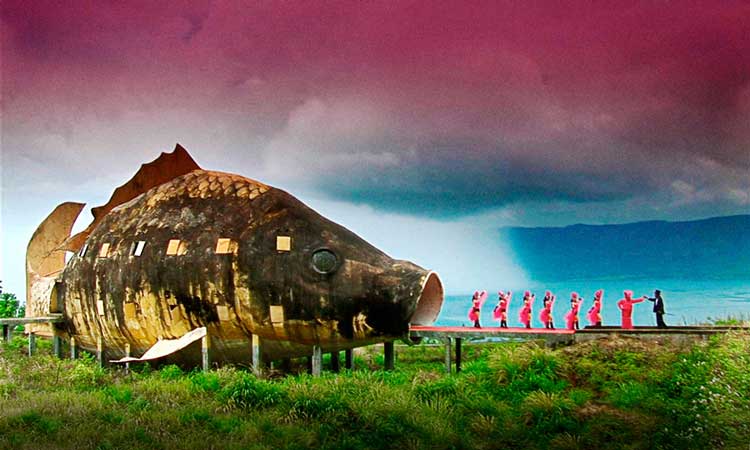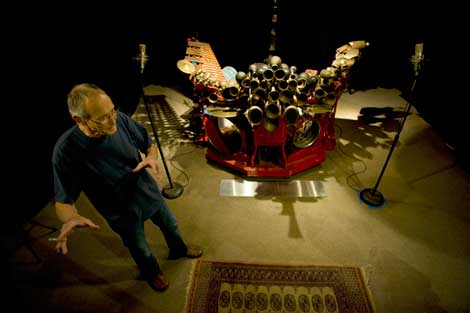While sagas of personal transformation are a staple of recent nonfiction filmmaking—from U.N. peacekeeper Roméo Dallaire’s inexorable drift into despair (and back) in the CBC’s Rwanda documentary Shake Hands With the Devil, to crack-mom Kirk White’s unexpected ascent into rehab in the Dickhouse sleaze-fest The Wild and Wonderful Whites of West Virginia—two entries in the 2013 Los Angeles Film Festival take the motif a significant step further. In Tamar Halpern and Chris Quilty’s Llyn Foulkes One Man Band, a contender in the Documentary Competition, and in Josh Oppenheimer’s The Act of Killing, exhibited as part of festival’s International Showcase, the filmmakers themselves, standing outside the frame but very much part of the picture, take on the role of confessor, facilitating—or in Oppenheimer’s case, guiding—their subjects’ journey toward a deeper appreciation of their human condition and pointing the way forward to one or another species of redemption.
In opening his heart to Halpern and Quilty, for example, artist-musician Llyn Foulkes pushes through to levels of self-understanding that may no longer be available to him qua artist-musician. Over the more than seven years (2004–2012) it took to shoot the film, its subject—who is never less than honest with his interlocutors, and who over time comes to suspect that “artists don’t have effects any more” (see also Auden’s “Poetry makes nothing happen”)—provides ample glimpses into his personal history and studio practices even as his mood shifts from a reflexive sense of injury at the hands of the LA art establishment (“Is it ever going to be my time?”) to a pained acknowledgment of his penchant for self-sabotage (“I’m not very friendly” or “I’m too self-centered”) and a wholesale reassessment of his vocation (“I’ve put art on too high a pedestal” and “I’m tired of being a one-man band”). Meanwhile, the filmmakers’ narrative line takes us from a chronicle of perceived insult and injury, reaching its nadir in the aftermath of 2004’s poorly attended group show at New York’s Kent Gallery (to which Foulkes contributed a single large painting), to one of triumphant vindication, culminating in a 2011 Art in America cover story and in this year’s widely attended, universally lauded career retrospective at the Hammer. (If the show had a metacritic.com rating, it would be somewhere in the high 80s.)
As the story line changes, so do the questions raised in the talking-head commentary by curators, critics and other artists, from “Why hasn’t Foulkes achieved the kind of recognition and earning power accorded other Ferus alumni?” to “Is Foulkes finally about to achieve the kind of recognition and earning power accorded other Ferus alumini?” to “Will success spoil—no, make that satisfy—Llyn Foulkes?” “Perhaps!” answer the filmmakers, though not as confidently as that exclamation mark might suggest.
While Llyn Foulkes’ repeated threats to “quit art” if “something doesn’t happen this time” (the art-world equivalent of Eric Cartman’s “Screw you guys, I’m going home!”) may, post-Hammer, seem a case of flogging an already decomposed horse—the slack final third of Halpern and Quilty’s film shares a little of this quality—the end result of all that Sturm und Drang in all the aforementioned movies lies, of course, outside their time frame. Maybe even outside time.
How ephemeral, after all, is the issue of our best intentions? In the case of Anwar Congo, chief among the decidedly inhuman human protagonists of the Danish-British-Norwegian coproduction The Act of Killing, we must suspect the worst. In a surreal variation on the truth-commission process that attained prominence following the fall of South Africa’s apartheid government and during Rwanda’s post-civil-war reconstruction, London-based filmmaker Josh Oppenheimer offered a group of elderly, well-heeled Indonesian thugs who, in the 1960s, were enlisted by the Suharto government to carry out genocide against more than a million Indonesian “communists” the opportunity to stage reenactments of their crimes against humanity—on camera, with a budget, and props, and costumes, and with a mandate to recreate their favorite American film genres! Predictably, gangster films, horror films, and westerns figure prominently, as do Bollywood-style production numbers. And where did Congo and company turn for their extras? To the very neighborhoods and villages they had terrorized 50 years earlier, casting as victims both the children of those they had terrorized, many of them witnesses to the original atrocities, and the hitherto insufficiently traumatized grandchildren of the historical victims, kids who no doubt grew up listening to eyewitness accounts of those same atrocities.
All of which makes for an unbelievably interesting and original documentary—so interesting and original, in fact, that when Werner Herzog and Errol Morris saw early cuts of The Act of Killing, they immediately signed on as executive producers. Which is no surprise, given the levels of weirdness involved. Over and above the already enumerated grotesqueries of Oppenheimer’s film—grotesqueries which shouldn’t, by the way, be mistaken for the point of the exercise—is the fact that the dapper Congo and his less fashion-forward colleagues (one of them with a penchant for cross-dressing) are by no means pariahs in present-day Indonesia.
Quite the contrary. In the minds of many Indonesians—not least of all the members of the paramilitary Pancasila Youth organization to which Congo and his cronies today act as advisors and role models—anti-communism is still, as it was under Suharto, the state religion. For these young fascists, in their inappropriately garish red-and-black camouflage outfits, the old-school perpetrators of so many shootings, garottings and beheadings, to say nothing of their enthusiastically enhanced interrogation techniques—all arguably conducted more for the sake of purging Indonesia of ethnic Chinese than of actual communists—are culture heroes.
And so it goes, until one of those culture heroes—in the interest of adding another dash of spice to his legacy—puckishly announces his intention to play the victim in one of the grislier reenactments. (“Come watch grandpa get tortured and killed!”) That, folks, is the turn of events that puts The Act of Killing firmly in step with the through-line of the report you’ve just finished reading.
THE ACT OF KILLING
A film by Joshua Oppenheimer
On DVD this November.
LLYN FOULKES ONE MAN BAND
A film by Tamar Halpern & Chris Quilty
To be released in 2014; check FB page
llynfoulkesonemanband for schedule of college & museum preview screenings.



